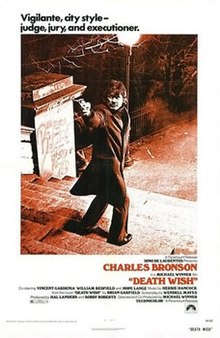Death Wish (1974 film)
| Death Wish | |
|---|---|

Theatrical release poster
|
|
| Directed by | Michael Winner |
| Produced by |
|
| Screenplay by | Wendell Mayes |
| Based on |
Death Wish by Brian Garfield |
| Starring | |
| Music by | Herbie Hancock |
| Cinematography | Arthur J. Ornitz |
| Edited by | Bernard Gribble |
|
Production
company |
|
| Distributed by |
Paramount Pictures (United States) Columbia Pictures (International) |
|
Release date
|
|
|
Running time
|
94 minutes |
| Country | United States |
| Language | English |
| Budget | $3 million |
| Box office | $22 million |
Death Wish is a 1974 American vigilante action film, loosely based on the 1972 novel of the same name by Brian Garfield. The film was directed by Michael Winner and stars Charles Bronson as Paul Kersey, a man who becomes a vigilante after his wife is murdered and his daughter sexually assaulted during a home invasion. It was the first of the Death Wish film franchise.
At the time of release, the film was attacked by many film critics due to its support of vigilantism and advocating unlimited punishment of criminals. The novel denounced vigilantism, whereas the film embraced the notion. The film was a commercial success and resonated with the public in the United States, which was facing increasing crime rates during the 1970s.
Paul Kersey (Charles Bronson) is an architect living in Manhattan with his wife Joanna (Hope Lange) and grown daughter Carol. One day, Joanna and Carol are followed home by three thugs who invade the apartment, posing as deliverymen. They fatally injure Joanna and sexually assault Carol. After his wife's funeral in Connecticut Paul has an encounter with a mugger on a darkened street. Paul makes an improvised blackjack consisting of two rolls of quarters in a sock, and fights back against the mugger, who runs away. Paul is shaken and energized by the encounter.
Paul's boss sends him to Tucson, Arizona to see Ames Jainchill (Stuart Margolin), a client with a residential development project. A few days later Paul is invited to dinner by Ames at his gun club. Ames is impressed when Paul shoots with near perfect accuracy on the target range. Paul reveals that he was a conscientious objector during the Korean War when he served as a combat medic. Paul had been taught to handle firearms by his father, a hunter, but after he was killed in a hunting accident Paul swore never to use guns again. Ames drives Paul back to the Tucson airport, and presents Paul with a gift for his work on the development, which he places into Paul's checked luggage.
...
Wikipedia
